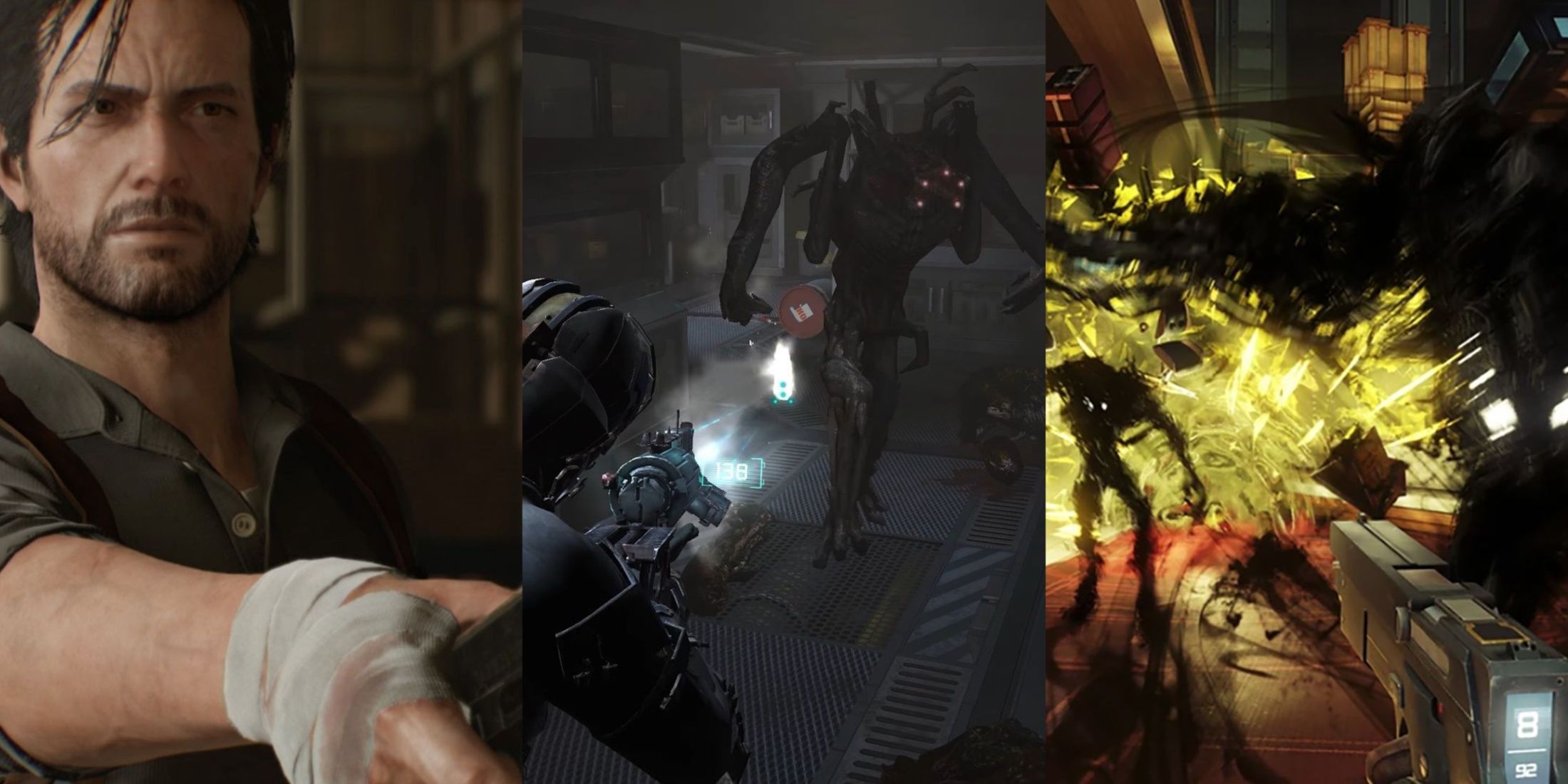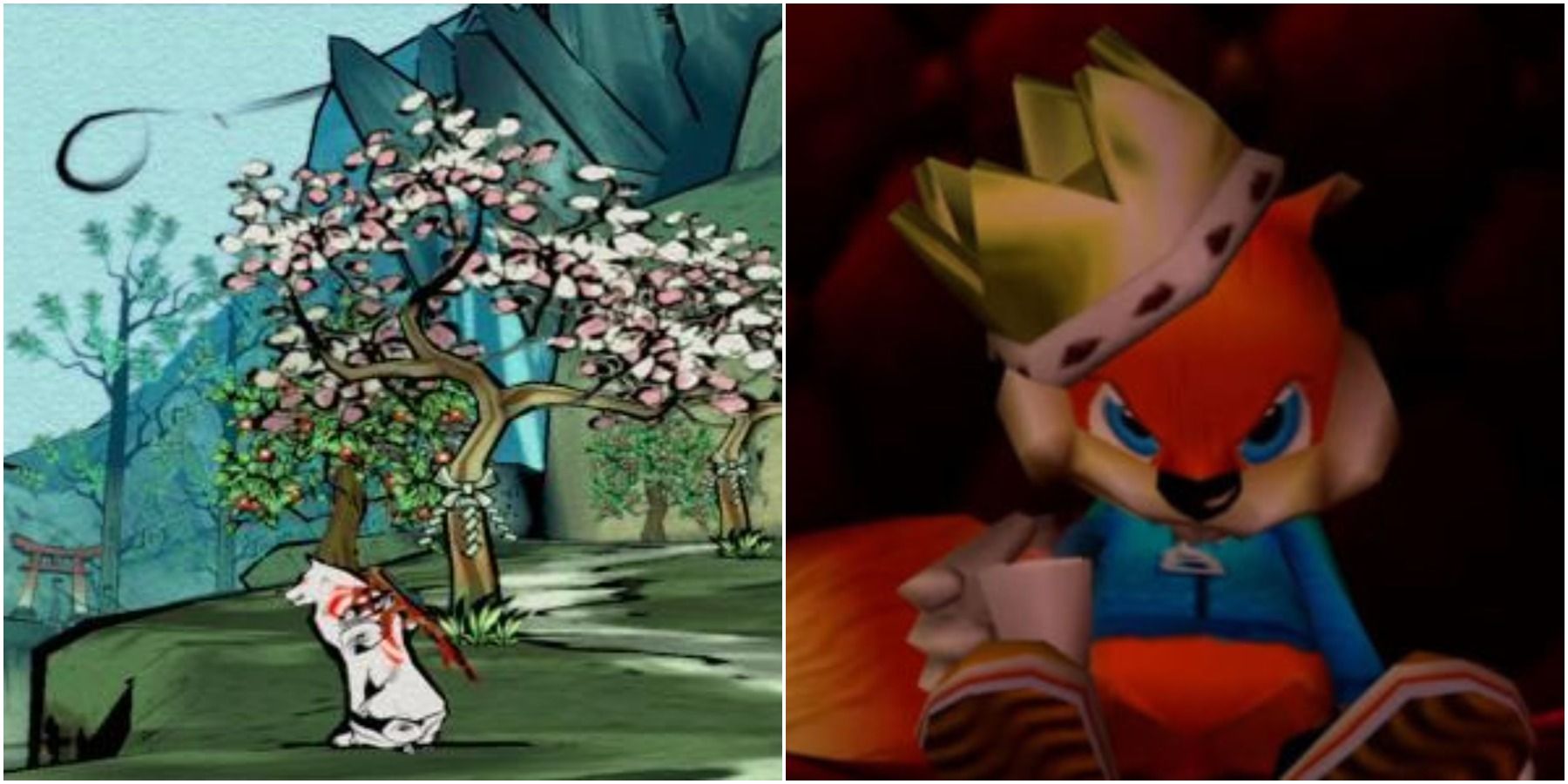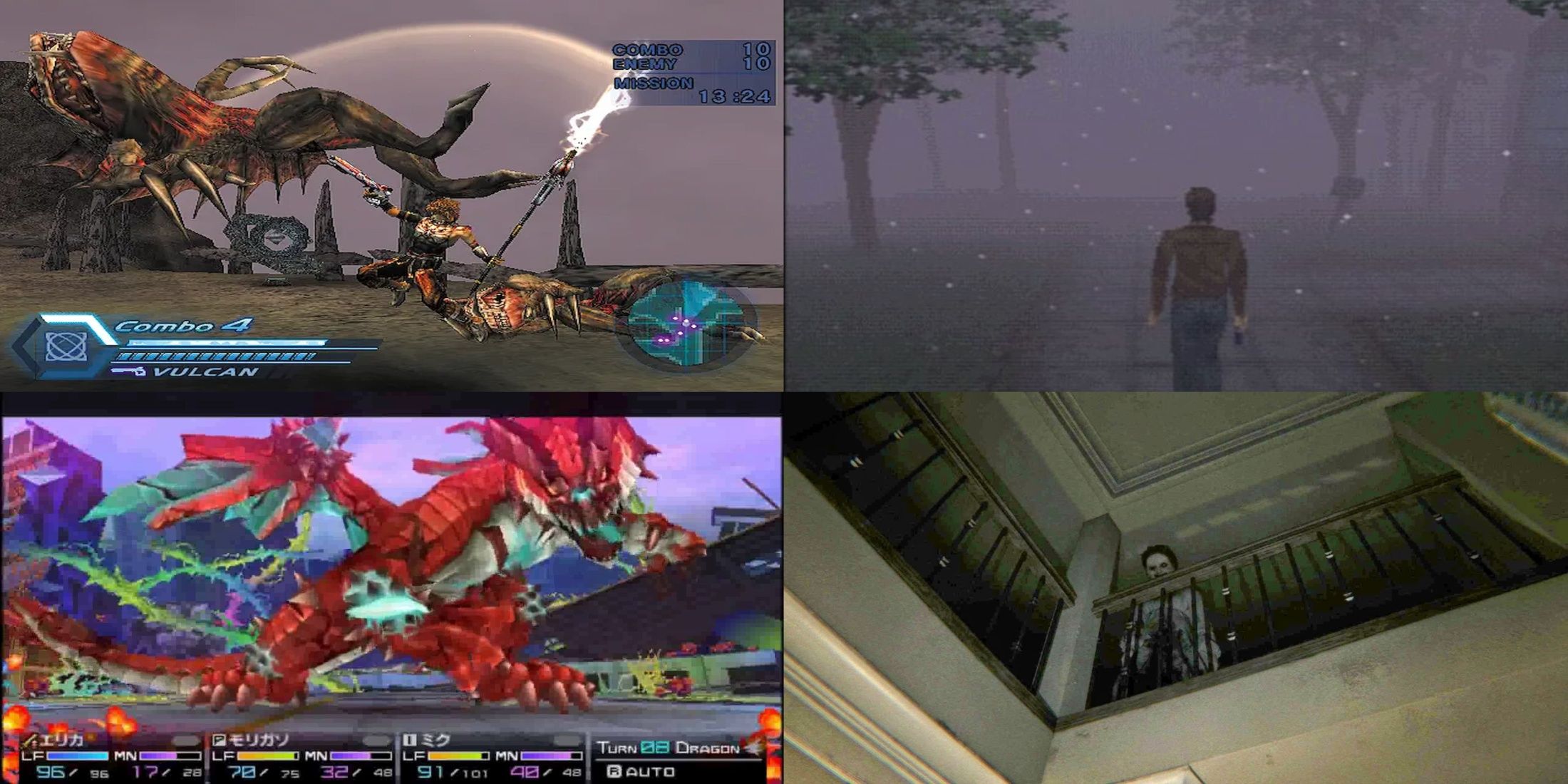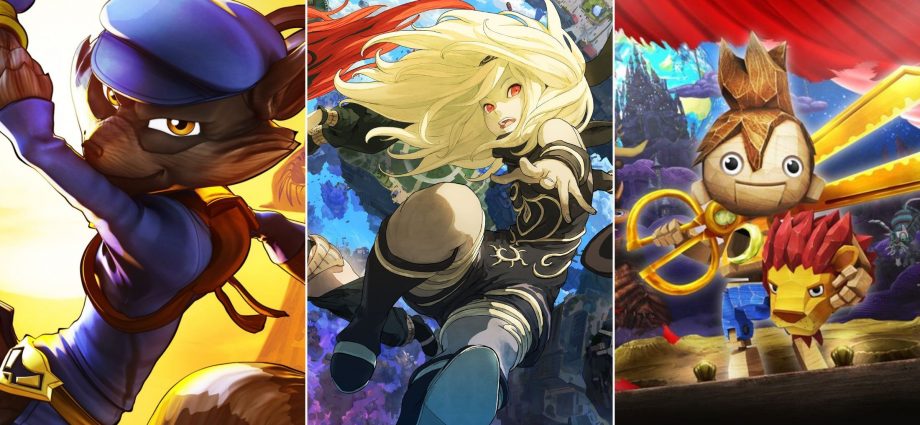Summary
- Debuting late in the PS3’s life led to poor sales for Sly Cooper: Thieves in Time, seeing as it only sold 570k copies.
- 2017’s Everybody’s Golf struggled due to the PS4’s lack of a casual audience, selling only 560k copies.
- The entire Gravity Rush series was a huge commercial failure, with all three games selling under 200k copies each.
PlayStation is one of the most successful gaming brands in the entire world, seeing as every single one of these consoles (from the PS1, all the way to the PS5) is among the top 20 best-selling video game systems ever made. Needless to say, this also means that most of the software made exclusively for PlayStation consoles has also been very profitable, whether it was developed by Sony or by an affiliated third-party studio.

Related
8 Great Horror Games That Sold Poorly
These horror games deliver a variety of frightening experiences across their diverse settings, but they all share one thing in common: poor sales.
However, this isn’t always true, because a fair share of PlayStation exclusives sold so poorly that they ended up becoming commercial failures that affected their respective companies in one way or another. Regardless of the reason behind their lack of success (like poor timing, lackluster marketing, questionable business decisions, etc.), the following eight PlayStation exclusives are some of the absolute worst-selling games in the brand’s entire history.
8
Sly Cooper: Thieves In Time
A Great Sequel That Accidentally Left A Beloved Franchise Dormant
- Sales: 570,000 copies (2018)
Sly Cooper was one of the most beloved and iconic platforming mascots of the PS2, right alongside Jak & Daxter and Ratchet & Clank. However, its original developer, Sucker Punch Productions, moved on to the more mature Infamous games during the following generation, leaving the Sly Cooper series dormant until Sanzaru Games stepped up to make the long-awaited fourth entry.
This resulted in Sly Cooper: Thieves in Time, a very solid 3D platformer that was praised for its colorful art style, its vast collection of playable characters, and its fun platforming challenges, even though many fans also criticized its plot and open ending. Despite its positive reception, Thieves in Time barely managed to sell 570,000 copies, most likely because it came out way too late in the PS3’s life, just a few months before the release of the PlayStation 4. Sony must have definitely considered it a commercial failure, because not only has there not been a new game in the series ever since, but the company also seemingly canceled the animated Sly Cooper movie that was announced in 2014.
7
Everybody’s Golf
An Excellent Sports Game That Couldn’t Find The Casual Audience It Needed In Order To Survive
- Sales: 560,000 copies (2018)
Unbeknownst to most PlayStation fans, Everybody’s Golf (previously known as Hot Shots Golf) is one of the company’s longest-running exclusive franchises, which combines simple but engaging golf gameplay with a colorful aesthetic. Regardless of its reputation, the most recent entry in the series, Everybody’s Golf from 2017, was a shocking commercial failure, both for Sony and for its developer, Japan Studios.
It’s difficult to pinpoint exactly why Everybody’s Golf barely sold over 550,000 copies in its first year, seeing as it actually got glowing reviews when it came out, but it may be simply because the PS4 did not really have a big casual audience that could enjoy these types of games. This may explain why the next entry in the series, the upcoming Everybody’s Golf: Hot Shots, is going to be released on PS5, Nintendo Switch, and PC. Unfortunately, it’s currently being developed by HYDE because Japan Studios closed down in 2021 and merged with other studios in order to form Team Asobi.
6
Klonoa 2: Lunatea’s Veil
This Adorable Mascot’s Second Adventure Didn’t Sell Many Copies On PS2
- Sales: 290,000 copies (2001)
Klonoa may not be as popular as Sony’s own platforming mascots, but he still became synonymous with the PlayStation brand during the late 90s and early 2000s. His first game, Door to Phantomile, was a whimsical and colorful 2D platformer that Namco released for the PS1 in 1997. Its sequel, Klonoa 2: Lunatea’s Veil for the PS2, was even better because it had more impressive graphics, a more colorful art style, bigger levels, and smoother gameplay.

Related
7 Great Games That Sold Poorly
Lack of financial success doesn’t always mean an absence of quality. These great games didn’t make a lot of money but are still worth playing.
Unfortunately, and despite all the accolades it received, Klonoa 2 couldn’t even sell 300,000 copies, and Namco itself deemed it a commercial failure, because it was expecting this sequel to sell over 900,000 copies. After that, the Klonoa series lay low for almost two decades, only receiving a few spin-offs and a solid Wii remake of the first game, but passionate fans are still waiting for Bandai Namco to make the long-awaited third entry someday. Fortunately for them, the first two games were remastered for the 2022 compilation, Klonoa Phantasy Reverie Series, which got positive reviews and sold relatively well, so maybe Klonoa 3 will happen sooner than expected.
5
Xenosaga Episode 2 / Xenosaga Episode 3
A Niche RPG Trilogy That Couldn’t Sell Many Copies After Its First Episode
But Klonoa was not the only Bandai Namco series that was struggling to sell enough copies during the PlayStation 2 era. Something similar (but even more fascinating) happened with Monolith Soft’s Xenosaga series. Its first entry and the first part of this trilogy, Xenosaga Episode I: Der Wille zur Macht, came out in 2002 exclusively for the PS2, and not only did it receive positive reviews, but it also sold over 1 million copies worldwide, according to Bandai Namco.
However, its two sequels were not so lucky: Xenosaga Episode 2: Jenseits von Gut und Böse came out in 2004 and sold only 280,000 copies in its initial year, less than half the total sales of its predecessor. Xenosaga Episode 3: Also sprach Zarathustra came out two years later and sold 343,000 copies, which was a little better, but it still heavily underperformed. The reviews of each new entry got more and more mixed with time, as it seemed both critics and fans were slowly getting tired and confused by the trilogy’s signature storytelling and formula. This polarizing reception (combined with the second and third episode’s low sales) inspired Monolith Soft to make a brand-new game in the Xeno franchise, which would later become Xenoblade Chronicles for the Nintendo Wii.
4
Puppeteer
A Colorful And Charming 2D Platformer That Deserved Much Better
- Sales: 270,000 copies (2018)
The PlayStation brand is not known for having too many exclusive 2D platformers under its name (with the only prominent exception being the LittleBigPlanet series), which is a real shame, because this family of consoles has spawned some really solid games in this genre that flew under the radar. One of them is 2013’s Puppeteer, a lovely 2D platformer with a unique puppet show aesthetic and excellent gameplay.
Puppeteer is a true work of art that has been endlessly praised by those who experienced it, but, unfortunately, it performed quite poorly, with only 270,000 copies sold in five years. This game not only received little to no marketing from Sony, but (similarly to Sly Cooper: Thieves in Time), it was released a few months before the launch of the PS4, so most people were not even aware that it existed until it was already too late.
3
Shadow Hearts
Another Unique PS2 JRPG That Gained A Cult Following Despite Its Low Sales
- Sales: 110,000 copies (2002)
Just like its predecessor, the PlayStation 2 was a perfect console for fans of turn-based JRPGs, since it had a lot of high-quality titles to choose from. However, it seems that at one point the genre went through a bit of an oversaturation because some of them heavily underperformed in terms of sales, with one of the most prominent examples being 2001’s Shadow Hearts.

Related
6 Great Open-World Games That Sold Poorly
Despite weak financial results, fans of the genre are sure to have tons of fun with these open-world games.
This turn-based RPG by Sacnoth was praised for its impressive graphics, its unique setting, and its refreshing Judgement Ring mechanic, which made the gameplay way more involved and interactive than in most of its contemporaries. However, despite all of its positive qualities, it barely sold over 100,000 copies and caused major losses at its development studio. Fortunately, Shadow Hearts eventually gained a cult following, and Sacnoth was able to make a sequel in 2004, titled Shadow Hearts: Covenant.
2
The Gravity Rush Series
One Of The Most Interesting PlayStation IPs Was Also A Commercial Failure
- Gravity Rush Sales: 200,000 copies (2012)
- Gravity Rush Remastered Sales: 25,000 copies (2016)
- Gravity Rush 2 Sales: 102,630 copies (2017)
It’s almost inconceivable to think that an entire PlayStation exclusive series that’s fully owned by Sony would even be a commercial failure, but this is sadly what happened to the excellent Gravity Rush franchise. For starters, the very first entry was a PlayStation Vita exclusive, and, since that infamous handheld didn’t sell very well, this game was also destined to fail, with only 200,000 copies sold in its first year. While it was remastered for PlayStation 4 in 2016 and thus, it was made more accessible for an even broader audience, Gravity Rush Remastered also sold extremely poorly in its first year, with only 25,000 copies in total.
Fortunately for this series’ small but passionate fan base, Sony green-lit an official sequel titled Gravity Rush 2, which released on PS4 in 2017 but sold even worse than both its predecessors, with a little over 100,000 copies sold in its first year. The failure of the Gravity Rush series is extremely unfortunate because these are actually great games that feature a beautiful gothic aesthetic, lovable characters with excellent designs, and brilliant gameplay that revolves around manipulating gravity in 3D environments. While Gravity Rush 2’s poor sales were most likely caused by Sony’s almost non-existent marketing, fans are still hoping that the company will change its mind and greenlight a third entry that will revive this franchise and help it earn the reputation it deserves.
1
God Hand
This Frenetic Action Game Marked The Beginning Of The End For Clover Studios
- Sales: 60,000 copies (2006)
Capcom’s subsidiary, Clover Studios, pretty much became synonymous with the term “cult classic” during the sixth generation of consoles. All the games it released during that time – like Viewtiful Joe or Okami – sold very few copies, despite being highly praised by critics and gaining huge cult followings. However, most of these projects were released on more than one console, and only one of them was 100% exclusive to the PlayStation 2: God Hand.
This is a very distinctive beat ’em up game with dynamic hand-to-hand combat, fast-paced gameplay, bizarre characters, and excellent boss fights. However, God Hand was a massive commercial failure for Capcom, which only managed to sell 60,000 copies in its initial year, most likely because it came out on the PS2 just a few weeks before the release of the PlayStation 3. However, the fact that most reviewers at the time gave it low scores because they couldn’t enjoy its unique style certainly didn’t help. The failure of both God Hand and Okami prompted Capcom to shut down Clover Studios in 2006, and most of its developers went on to form PlatinumGames a year later.

MORE:
5 Great PlayStation Exclusive Games You Cannot Buy Anymore
There have been countless PlayStation exclusives since the PS1, and many great games have come and gone, with some completely vanishing from stores.
